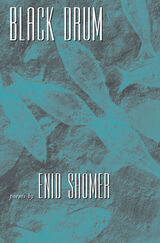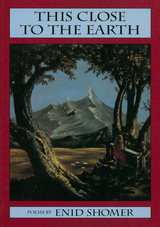
In Black Drum, Enid Shomer fuses mind with body, knowledge with physical being, and affirms the capacity of language to accomplish this fusion. With clearly fashioned images, her focus often narrows on close particulars or leaps to wide angles, as in these lines from the title poem in which the narrator is battling a fish:
We had been struggling for ten
minutes—a lifetime—over whose world
would prevail: his, with its purled
edges and continuous center, or mine
with its yin and yang,
its surface incised into sky
and sea, the land like a scar
between.
The characters in Shomer’s poems discover the ceaseless motion of living in the body and the inevitability of decay. In “Notes from the Sketch book of Gustav Klimt,” Shomer boldly says, “I have always balked / at the purely decorative, / but then I saw that the symbolic / could stir us by its absence.”
Black Drum insists that life on earth speaks of transformation and transience; epiphany can happen any where, with “schemes illegal and grand” with slot machines, race horses, dead or estranged relatives, and lost love. Enid Shomer signals us to make the most of life, despite our limitations and in the face of bewildering catastrophe.

Even the tamest characters in Imaginary Men test the rules to see where they can be broken and where they hold true. In Enid Shomer's world, endless misunderstandings sprout from goodwill, women and men burn with a desire that forces them to create themselves as they evolve, people grasp their relatedness to others only fleetingly, goodness is as great a mystery as evil.
For the unappreciated Harry Goldring, tormented by his unshakable label of familymensch, wildness is expressed first in panic attacks, then in daydreams. At the other end of Shomer's highly colored spectrum is killer Elvis Thornberry, a “man you wouldn't notice unless he held a gun to your head or saved your life.” Balancing these more troubled characters are Shomer's many improbable lovers and friends: Lavell, who sees something of herself in the untrainable hunting dog owned by her younger lover; Diane, who takes back her unfaithful husband only after inventing a lie that puts her on an equal footing; Leila Pinkerton and Fontane Walker, who were "as close to friendship as they could get, given that Leila was white, Fontane was black, and they lived in a world full of people who claimed to know what that meant."
In all of Shomer's powerful stories, family is the mold we break out of as well as the lap we seek comfort in; family myths create mysterious emblems of freedom. Listening to her resonant voice, we witness the wild, raw moments when people lose control, when the wildness—submerged or not—that they both avoid and rush toward bleeds through.

These poems give voice to the life of the first woman to fly faster than the speed of sound. While Jacqueline Cochran was alive, no man or woman in the world could match her records for speed, distance, and altitude flying. Founder and director of the Women’s Airforce Service Pilots (WASP) during World War II, Cochran continued to fly competitively until she was sixty, owned and operated her own line of designer cosmetics for three decades, ran for Congress, and generally placed herself on the path of history. Having begun life as a foundling in the crushing poverty of a lumber company town of the Florida panhandle, she described her life as “a passage from sawdust to stardust.” Yet after her death she has barely been remembered.
Poet Enid Shomer brings back this mercurial, dazzling, powerful woman. These poems speak in her voice and in the voices of her mother, teachers, husband, confidants, and political opponents, shaped by Shomer’s consummate formal control and stunning lyricism.

READERS
Browse our collection.
PUBLISHERS
See BiblioVault's publisher services.
STUDENT SERVICES
Files for college accessibility offices.
UChicago Accessibility Resources
home | accessibility | search | about | contact us
BiblioVault ® 2001 - 2024
The University of Chicago Press









